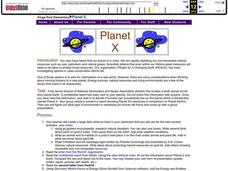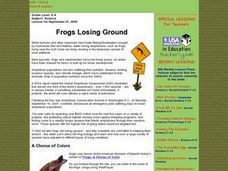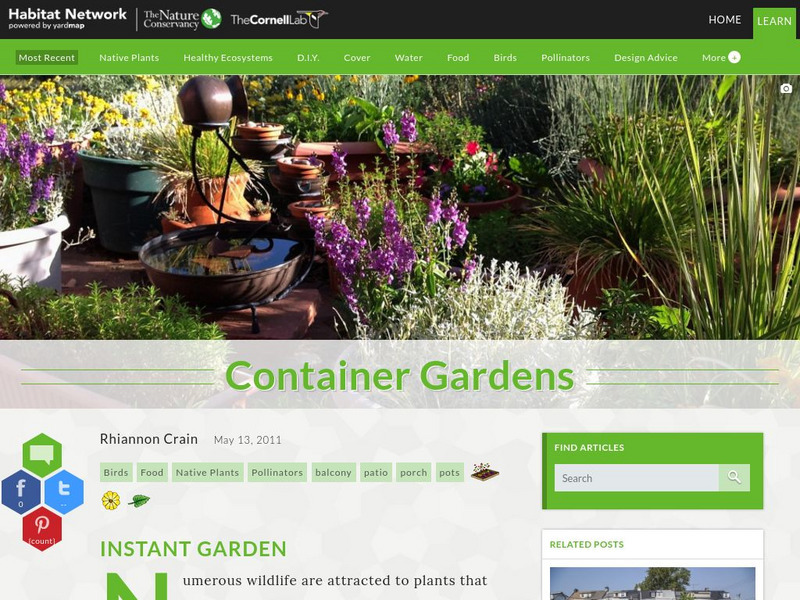Curated OER
Classifying Plants and Insects
Art and science come together in a lesson based on Flower Still Life by Ambrosius Bosschaert the Elder. Learners classify plants and insects in the painting by color, leaf shape, size, reproduction, and season of bloom.
Forest Foundation
Fire - How Does it Relate to You?
Forest fires can be a necessary step in keeping a forest healthy, but what happens when they get out of control? Learners investigate the causes and effects of forest fires in two specific areas, culminating in a report about the ways...
Wild BC
Bearly Any Ice
After reviewing food chains, your class members participate in an arctic predator-prey game that exemplifies the impact of climate change of food availability. If you are in a hurry, skip this lesson, but if you have the time to...
Curated OER
BIOME VIDEO Exchange Project
Students videotape information about the biome in which they live without naming it and send this to other students across the nation so they can guess which biome it comes from. Students include local ecosystems, information concerning...
Curated OER
"Oh Deer!"
Students play a game where half of them are deer and the others are components of habitat: food, water, shelter and space. They signify their needs by hand gestures and take what they need to their side of the game. They discuss real...
Curated OER
Gardening for Beauty, Food, and Enjoyment
First graders create their own garden. In this plant lesson, 1st graders discover the essential elements for a plant to grow. They planted their own garden and read the amount of space needed and the sunlight preferred for each plant.
Curated OER
Animal Movements
Students discuss the behavior of different animals and how they move. They explore the ways that this helps them live and find food in their environment. They participate in a game that requires them to mimic the ways in which animals move.
Curated OER
Watch Over Wild Wanders
Students collect and organize data relating to migratory species and habitats; undertake a habitat action plan, then maintain planting and building projects for continuing benefit to wildlife; understand the unique needs of migratory...
Curated OER
Great River Bend Adventure
Students use their imagination. They discuss the 4 C's of teamwork: Concentration, Communications, Coomperation, and Consideration. Students discuss the safety guidelines of the project. They complete a rope maze. The group walks...
Curated OER
Planet X
Students select a wide variety of presentation methods to compare Planet X and Earth. Students share these with their classmates. Students select other methods to present their ideas about a livable planet for human life forms. ...
K12 Reader
Endangered Species
Your learners have likely heard about animals going extinct. By reading this passage, they can find out some reasons why this happens and how to protect endangered species. After reading, individuals respond to five related questions.
Curated OER
Parasite Development and Life Cycle
If you are new to teaching agriculture classes, this outline may be helpful when you are preparing a lecture on parasites in livestock. In addition to lecturing on this topic, the lesson plan suggests that learners research the life...
Curated OER
Insects
Third graders research an insect and creates a brochure on that selected insect. Each student develops a Venn Diagram comparing similarities and differences between moths and butterflies.
Curated OER
Frogs Losing Ground
Learners explore an exhibit through an interactive program on frogs. They can listen to the different sounds frogs make and the different types of frogs. They search for the types of frogs they find in their local area.
Curated OER
Data Habitats
Students develop data acquisition skills and quantify descriptive data. In this data lesson students divide into groups and do an activity that shows them why it is important to record data with accuracy and consistency.
Curated OER
Science: Where the Worms Live
Students build mine-earthworm habitats to discover their niche in them. They make predictions about what the niche looks like in a week and draw a picture of it. Students notice the tunnels in the soil and how the sand and dirt are now...
Curated OER
The Environment and Interactions of Living Organisms
Students study the environment and interactions of living organisms. They identify abiotic and biotic factors and create a foldable and vocabulary cards. They create a poster illustrating soil and watch a video to study symbiosis.
Curated OER
Mushroom
Students identify the different types of mushrooms. In this biology lesson, students explore different mushroom experiments they can do at home. They discuss ways to extend sliced mushrooms' shelf life.
Curated OER
Overpopulation
Students examine population growth and how it impacts our environment. In this population lesson students identify the causes and consequences of overpopulation.
Curated OER
Hide & Seek Butterflies
Students examine a variety of butterflies and discuss how they believe they get their color variations. In groups, they brainstorm the advantages and disadvantages of their color schemes. To end the lesson, they watch butterflies in...
Cornell Lab of Ornithology
Habitat Network: Container Gardens
Learn how to maximize the wildlife in a small space by planting a container garden.






















